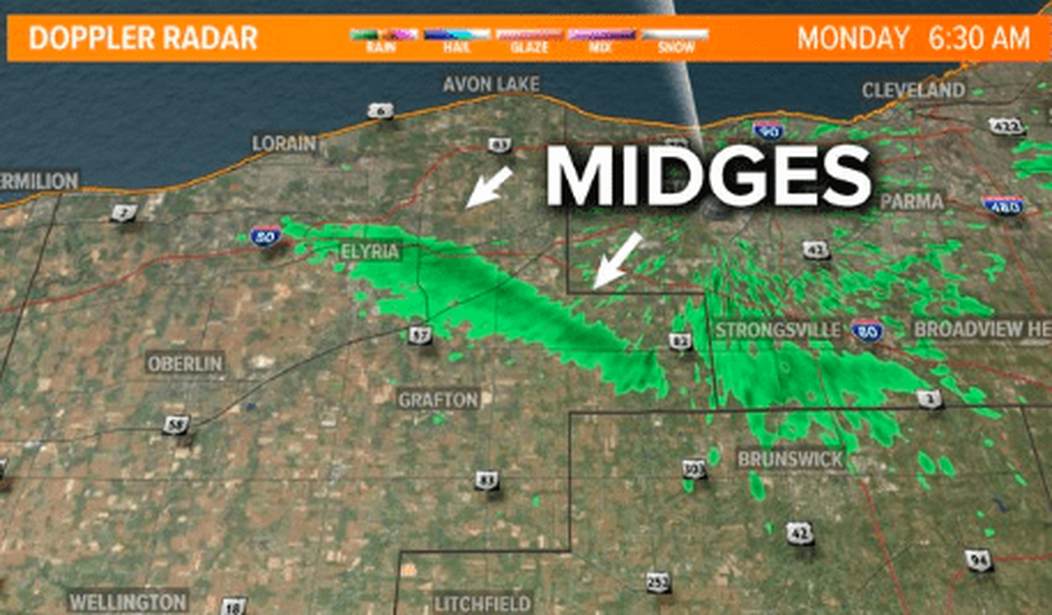In what has become an annual ritual in Northeast Ohio in June, the Lake Erie midges have descended upon the area, traveling in swarms large enough to show up on weather radars in Cleveland. The tiny mosquito-like insects are more of a nuisance than a danger, but area meteorologists and residents had plenty to say about them nonetheless.
Jason Nicholas, chief meteorologist at Cleveland 19 News, tweeted out an image of the massive swarm over Cleveland:
Midges. Are. Back. pic.twitter.com/solrUiZwgD
— Jason Nicholas (@JasonNweather) June 4, 2018
Michael Estime, a meteorologist at WKYC TV, tweeted that his station was tracking the midges:
We're tracking a SWARM of MIDGES on RADAR! Yikes! pic.twitter.com/IB7E0lATR7
— Michael Estime (@MichaelEstimeWX) June 4, 2018
Homa Bash, a reporter at WEWS News in Cleveland, complained about the bugs flying into her mouth while she was trying to record a segment:
tried really hard to keep my mouth shut during today’s live shots so I didn’t have to eat any more midges than necessary. pic.twitter.com/Fyg9q13uby
— Homa Bash (@HomaBashWEWS) June 5, 2018
Reporter Dan DeRoos from Cleveland 19 shared a picture of a huge cloud of midges floating over the city.
Nope not smoke, not thin clouds but swarms of thousands of midges. #midges #midgeswarm pic.twitter.com/8V2JzhdY0s
— Dan DeRoos (@DanDeRoos19) June 5, 2018
JD Rudd from WEWS-TV showed what the swarm looked like in motion on the weather radar.
Okay, NE Ohio… I need your help! This isn't rain. It's gotta be something biological… birds, bugs. I'm thinking midges! What are you seeing?! pic.twitter.com/jbrlDc3Sl3
— ⚡JD Rudd ☈ (@jdrudd) June 4, 2018
Area residents shared their own pictures of the invasion:
Another beautiful sunset framed by midges. #Cleveland pic.twitter.com/EQd4ssLlOo
— Ian Shakelton (@iShakelton) June 6, 2018
No one told me about midges before I moved to Cleveland. Literally overnight there are millions of these little dudes covering every surface. pic.twitter.com/NbBeGzDwMO
— Loaf🍞of😬Dread (@LoloLoaf) June 4, 2018
Here’s what they look like up close:

Progressive Field was hit especially hard by the midges, no doubt because of their attraction to bright lights:
Tribe Fans! Up on your feet! It’s time for the 7th Inning Stretch! (Even you Midges!) #Midges #JobaFlies #TribeLive @Joba_44 @Indians pic.twitter.com/SgYo8OiITW
— Kerry☘️⚾️ (@VeryGoodKerry) June 6, 2018
Many fans recalled the 2007 ALDS series between the Indians and the Yankees, when Yankees pitcher Joba Chamberlain called coaches and trainers to the mound to help him deal with the pests.

As horrifying as that may seem, Indians pitcher Fausto Carmona (aka Roberto Hernandez) was unphased by the midge swarm buzzing around his head, striking out Alex Rodriguez in the top of the 9th to win Game 2 of the series. The Indians would go on to win the ALDS that year.
Dr. Gavin Svenson, assistant director of science, curator and head of Invertebrate Zoology for the Cleveland Museum of Natural History, shared a few facts about the midges with Cleveland 19:
- Midges are small flies related to mosquitoes and crane flies. Thankfully they don’t bite.
- They spend most of their lives as worm-like larvae on the bottom of [Lake Erie].
- They live as adults for a short time and gather in large swarms to find a mate and reproduce.
- Adults are thought to not feed, but evidence suggests that they will eat nectar and pollen to extend their lives.
- They are harmless to humans and do not carry any diseases.
- A healthy population of midges means plenty of food for the animals that depend on insects as food.
Luckily, the lifespan of the midges coming off the lake is only around ten days. But in the meantime, if you’re in the area, keep your mouth closed and take comfort in the fact that the little buggers are essentially harmless.
Follow me on Twitter @pbolyard










Join the conversation as a VIP Member